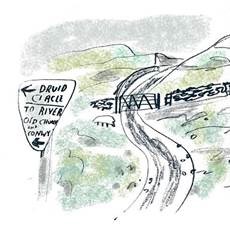
- This event has passed.
Irish Studies’ Seminar Series – Semester 2, 2018-19
March 28, 2019 @ 4:00 pm
Event Navigation

Artwork by Desdemona McCannon
Dr Pippa Marland (Moore Institute Visiting Fellow), “‘The world-hungry art of words’: form and content in Tim Robinson’s Stones of Aran”,
A chairde,
You are invited to attend our forthcoming seminar as part of the Irish Studies’ Seminar Series, Semester 2, 2018-19. We are delighted to welcome Dr Pippa Marland from the University of Leeds as an Irish Studies’ Scholar through the Moore Institute Visiting Fellowship Scheme this year. Dr Marland will deliver her seminar entitled, “‘The world-hungry art of words’: form and content in Tim Robinson’s Stones of Aran”, at 4pm on Thursday 28 March, Seminar Room, Centre for Irish Studies.
This seminar will explores the content and form of Robinson’s Aran writings – looking at what it might mean for the literature of place to be both ‘world-hungry’ and artful – and will draw on research in the James Hardiman Library’s Tim Robinson archive. In particular it will explore the ways in which Robinson orders and condenses material from his extensive Aran notebooks and diaries into the final complex, challenging form of the Aran books.
Beidh fáilte roimh chách!
Le gach dea-ghuí,
Nessa
Dr Nessa Cronin, Centre for Irish Studies, NUI Galway.
‘The world-hungry art of words’: form and content in Tim Robinson’s Stones of Aran
Small islands, as Robert Macfarlane points out, foster ‘dreams of total knowledge’. This is precisely the effect that Árainn has on the writer Tim Robinson, who, in the Stones of Aran diptych, does indeed set out to describe the island in its totality. It is a demanding task – one that moves the erstwhile visual artist and cartographer into the realm of ‘the world-hungry art of words’.
This is a telling phrase, not least in its deployment of the word ‘art’. Non-fiction, place-based writing is often assumed to forgo artfulness in favour of mimetic representation. The ecocritic Dana Phillips, reacting against the focus of first wave American ecocriticism on this particular genre, argues that it is ‘one of literature’s more pedestrian, least artful aspects’, with the implication that the critic’s time would be better spent on more sophisticated literary forms. Robinson is undoubtedly pedestrian, in the very literal sense that his knowledge of the island is gained, as he states in an interview, through walking the ‘network of tender little fields and bleak rocky shores of Aran’ until ‘I could have printed off a map of them by rolling on a sheet of paper’. However, his writing is also artful: highly-wrought and formally complex, as the tension between his dream of total knowledge and the ways in which the island constantly exceeds that knowledge plays out through the text.
This seminar will focus on the content and form of Robinson’s Aran writings – looking at what it might mean for the literature of place to be both ‘world-hungry’ and artful – and will draw on research in the James Hardiman Library’s Tim Robinson archive. In particular it will explore the ways in which Robinson orders and condenses material from his extensive Aran notebooks and diaries into the final complex, challenging form of the Aran books.
Dr Pippa Marland University of Leeds P.J.Marland@leeds.ac.uk
Dr Pippa Marland is a Research Fellow in the School of English at the University of Leeds, working on the AHRC-funded ‘Land Lines: Modern British Nature Writing’ project. She received her PhD from the University of Worcester in 2016, where she was also a lecturer, with a thesis on ‘The Island Imagination’ – a study of the representation of ‘islandness’ in contemporary non-fiction. A significant section of the thesis was devoted to Tim Robinson’s Aran writings – Stones of Aran: Pilgrimage and Stones of Aran: Labyrinth – and, indeed, Robinson’s concept of the ‘good step’, a motif that runs through both volumes of the Aran diptych, lies at the heart of the research. She is in the process of preparing a book based on her PhD entitled Ecocriticism and the Island: Readings from the British-Irish Archipelago, due to be published in the Rowman and Littlefield series ‘Rethinking the Island’ series in early 2020. She is also working on a co-edited collection for Routledge – Walking, Landscape, and Environment , forthcoming in 2019. She has published widely on ecocriticism, new nature writing, ecopoetry, and archipelagic perspectives, and was recipient of both the EASLCE and the ASLE-UK and Ireland awards for Best Postgraduate Essay in Ecocriticism, for articles on W.G. Sebald and Kathleen Jamie, respectively. During 2019 she will be taking up a Leverhulme Early Career Fellowship, also at the University of Leeds, studying the representation of farming in modern British nature writing.
While at the Moore Institute as a Visiting Fellow, Dr Marland will be carrying out research on the Tim Robsinon archive in the James Hardiman Library, looking in particular at the way in which Robinson condenses and orders material from his extensive Aran notebooks and diaries into the final, complex and challenging form of the Aran diptych. She will be presenting her findings at a guest seminar for the Irish Studies Spring series at NUI Galway.

